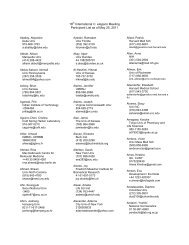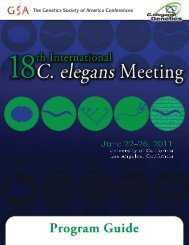- Page 1 and 2: 2013 C. elegans Meeting Organizing
- Page 3 and 4: GENERAL INFORMATIONRegistration and
- Page 5 and 6: GENERAL INFORMATIONInternet AccessU
- Page 7 and 8: EDUCATION OPPORTUNITIESSaturday, Ju
- Page 9 and 10: EXHIBITSMBF Bioscience Booth #11018
- Page 11 and 12: PLENARY, PARALLEL AND WORKSHOP LIST
- Page 13 and 14: PLENARY, PARALLEL AND WORKSHOP LIST
- Page 15 and 16: PLENARY, PARALLEL AND WORKSHOP LIST
- Page 17 and 18: PLENARY, PARALLEL AND WORKSHOP LIST
- Page 19 and 20: PLENARY, PARALLEL AND WORKSHOP LIST
- Page 21 and 22: PLENARY, PARALLEL AND WORKSHOP LIST
- Page 23 and 24: PLENARY, PARALLEL AND WORKSHOP LIST
- Page 25: PLENARY, PARALLEL AND WORKSHOP LIST
- Page 29 and 30: POSTER SESSION LISTINGS233A. Adapta
- Page 31 and 32: POSTER SESSION LISTINGS299A. Regula
- Page 33 and 34: POSTER SESSION LISTINGSRebecca Hint
- Page 35 and 36: POSTER SESSION LISTINGSassess devel
- Page 37 and 38: POSTER SESSION LISTINGSneurogenesis
- Page 39 and 40: POSTER SESSION LISTINGSelegans nerv
- Page 41 and 42: POSTER SESSION LISTINGSArantza Barr
- Page 43 and 44: POSTER SESSION LISTINGSEthanol. R.
- Page 45 and 46: POSTER SESSION LISTINGS742C. The Me
- Page 47 and 48: POSTER SESSION LISTINGS807B. Necrot
- Page 49 and 50: POSTER SESSION LISTINGSPiano.871C.
- Page 51 and 52: POSTER SESSION LISTINGSMarissa Macc
- Page 53 and 54: POSTER SESSION LISTINGS998A. A glob
- Page 55 and 56: POSTER SESSION LISTINGS1058A. Genom
- Page 57 and 58: POSTER SESSION LISTINGSmembrane tra
- Page 59 and 60: POSTER SESSION LISTINGSchromosome s
- Page 61 and 62: POSTER SESSION LISTINGS1243C. Towar
- Page 63 and 64: POSTER SESSION LISTINGScourse. Yan
- Page 65 and 66: ABSTRACTSelegans and other nematode
- Page 67 and 68: ABSTRACTS13. Magnetotaxis in C. ele
- Page 69 and 70: ABSTRACTSoocyte expression system,
- Page 71 and 72: ABSTRACTShermaphrodites have germli
- Page 73 and 74: ABSTRACTSgenes in AWC neurons, with
- Page 75 and 76: ABSTRACTSpropose a model in which c
- Page 77 and 78:
ABSTRACTSXSEs counter ASEs. Instead
- Page 79 and 80:
ABSTRACTSUNC-84 P91S mutation that
- Page 81 and 82:
ABSTRACTSdevelopment and physiology
- Page 83 and 84:
ABSTRACTSthe Eu form. Extra copies
- Page 85 and 86:
ABSTRACTSconserved. From an egl-9 s
- Page 87 and 88:
ABSTRACTSsenescence, and suggest th
- Page 89 and 90:
ABSTRACTScomposition of histone mod
- Page 91 and 92:
ABSTRACTS100. Periodic A/T rich DNA
- Page 93 and 94:
ABSTRACTSdemonstrates that seemingl
- Page 95 and 96:
ABSTRACTSSimilarly, Proteobacteria
- Page 97 and 98:
ABSTRACTSduring development of the
- Page 99 and 100:
ABSTRACTScoordinates to the time se
- Page 101 and 102:
ABSTRACTSresponse to light/H 2O 2.
- Page 103 and 104:
ABSTRACTS145. A Comprehensive Expre
- Page 105 and 106:
ABSTRACTS152. Silencing of Germline
- Page 107 and 108:
ABSTRACTSunderstood. In early C. el
- Page 109 and 110:
ABSTRACTSThe conserved E3 ubiquitin
- Page 111 and 112:
ABSTRACTSextract the locations of a
- Page 113 and 114:
ABSTRACTSPQC of the SAX-3/Robo rece
- Page 115 and 116:
ABSTRACTSmeasured by qPCR was reduc
- Page 117 and 118:
ABSTRACTSparent) abolishes transact
- Page 119 and 120:
ABSTRACTSAbrupt changes in environm
- Page 121 and 122:
ABSTRACTSdeclines through larval de
- Page 123 and 124:
ABSTRACTSbehind a biological behavi
- Page 125 and 126:
ABSTRACTSsets previously reported t
- Page 127 and 128:
ABSTRACTS234B. Examining neuromuscu
- Page 129 and 130:
ABSTRACTS241C. Genetics of praziqua
- Page 131 and 132:
ABSTRACTStype animals. The levels o
- Page 133 and 134:
ABSTRACTSfrom fish and rodents indi
- Page 135 and 136:
ABSTRACTScoming from the somatic go
- Page 137 and 138:
ABSTRACTScontrol of the elt-3/elt-5
- Page 139 and 140:
ABSTRACTSregulates SIR-2.1 in C. el
- Page 141 and 142:
ABSTRACTS287A. New roles for wdr-23
- Page 143 and 144:
ABSTRACTS295C. Does iron dyshomeost
- Page 145 and 146:
ABSTRACTS302A. HIF-independent proc
- Page 147 and 148:
ABSTRACTSduring aging. We found H3K
- Page 149 and 150:
ABSTRACTSNAD/sir2 pathway nor mitoc
- Page 151 and 152:
ABSTRACTSdetermine if there are pos
- Page 153 and 154:
ABSTRACTScondition. Furthermore, we
- Page 155 and 156:
ABSTRACTSdigested by Lys-C, and ana
- Page 157 and 158:
ABSTRACTSthe bulk of the aging rese
- Page 159 and 160:
ABSTRACTSa non-canonical CB recepto
- Page 161 and 162:
ABSTRACTS363B. Targeting Obesity: a
- Page 163 and 164:
ABSTRACTS(SREBP-1) ortholog (sbp-1)
- Page 165 and 166:
ABSTRACTSunderlying how animals ada
- Page 167 and 168:
ABSTRACTSfrom anoxia (Mendenhall et
- Page 169 and 170:
ABSTRACTSAnimals must coordinate nu
- Page 171 and 172:
ABSTRACTSexpression experiments, C.
- Page 173 and 174:
ABSTRACTSentomopathogenic nematodes
- Page 175 and 176:
ABSTRACTSpathogen.414B. Whole genom
- Page 177 and 178:
ABSTRACTShumans, making it an attra
- Page 179 and 180:
ABSTRACTSscreenings, in which the i
- Page 181 and 182:
ABSTRACTScentral regulator of the U
- Page 183 and 184:
ABSTRACTSwhipworms, and recent stud
- Page 185 and 186:
ABSTRACTSinteractions. The characte
- Page 187 and 188:
ABSTRACTStransformed each strain wi
- Page 189 and 190:
ABSTRACTSReconstitution Across Syna
- Page 191 and 192:
ABSTRACTSdendrite branching in the
- Page 193 and 194:
ABSTRACTStechniques we periodically
- Page 195 and 196:
ABSTRACTSmechanosensory PVD, is the
- Page 197 and 198:
ABSTRACTSsurvival, differentiation,
- Page 199 and 200:
ABSTRACTS503A. The effects of aging
- Page 201 and 202:
ABSTRACTS5 inhibits unc-2/unc-36 Ca
- Page 203 and 204:
ABSTRACTSsites and mediate excitato
- Page 205 and 206:
ABSTRACTSheterophilic interactions
- Page 207 and 208:
ABSTRACTS532C. A PCP-like pathway a
- Page 209 and 210:
ABSTRACTSobstacles: (1) the challen
- Page 211 and 212:
ABSTRACTSsynapses. The failure of t
- Page 213 and 214:
ABSTRACTSmutants have normal distri
- Page 215 and 216:
ABSTRACTSactivate selective neurons
- Page 217 and 218:
ABSTRACTS570B. Pattern generation i
- Page 219 and 220:
ABSTRACTSmutations disrupted UNC-43
- Page 221 and 222:
ABSTRACTSfor sharing unpublished da
- Page 223 and 224:
ABSTRACTSloss of the Notch receptor
- Page 225 and 226:
ABSTRACTStransiently increase by od
- Page 227 and 228:
ABSTRACTSreversals decremented with
- Page 229 and 230:
ABSTRACTSmeasure of phenotypic simi
- Page 231 and 232:
ABSTRACTSimplicated in mammalian sy
- Page 233 and 234:
ABSTRACTScomparison to behavior on
- Page 235 and 236:
ABSTRACTS640C. How do worms choose
- Page 237 and 238:
ABSTRACTSlarval training disrupts p
- Page 239 and 240:
ABSTRACTS1. Ishihara T et al. Cell,
- Page 241 and 242:
ABSTRACTSencoding gene, nlp-3, in t
- Page 243 and 244:
ABSTRACTSthat males exhibit defects
- Page 245 and 246:
ABSTRACTStargets for research. Our
- Page 247 and 248:
ABSTRACTSof ethanol increase BK cha
- Page 249 and 250:
ABSTRACTS693B. Exploring the role o
- Page 251 and 252:
ABSTRACTSdirected nematode behavior
- Page 253 and 254:
ABSTRACTS709C. Regulation of Coinci
- Page 255 and 256:
ABSTRACTS61 generation. We are plan
- Page 257 and 258:
ABSTRACTS724C. Robustness of the vu
- Page 259 and 260:
ABSTRACTSwas confirmed to be subcel
- Page 261 and 262:
ABSTRACTS739C. Investigating the ro
- Page 263 and 264:
ABSTRACTS746A. HAM-1: An asymmetric
- Page 265 and 266:
ABSTRACTSvulva formation. We examin
- Page 267 and 268:
ABSTRACTSof skn-1 function in the e
- Page 269 and 270:
ABSTRACTSPrevious work revealed tha
- Page 271 and 272:
ABSTRACTSour AB-enriched or P1-enri
- Page 273 and 274:
ABSTRACTSdisorders.783B. Blocking N
- Page 275 and 276:
ABSTRACTStouch receptor neurons we
- Page 277 and 278:
ABSTRACTSexpression of the ortholog
- Page 279 and 280:
ABSTRACTSdiseases from neurological
- Page 281 and 282:
ABSTRACTSthrashing, suggesting age-
- Page 283 and 284:
ABSTRACTSThese studies show that li
- Page 285 and 286:
ABSTRACTSdemonstrated; however enzy
- Page 287 and 288:
ABSTRACTS833A. Dynamically-expresse
- Page 289 and 290:
ABSTRACTSmultiple molecular cues wi
- Page 291 and 292:
ABSTRACTSMATLAB programs to quantif
- Page 293 and 294:
ABSTRACTSwith HPK-1::mCherry-expres
- Page 295 and 296:
ABSTRACTSThese results imply that t
- Page 297 and 298:
ABSTRACTS870B. Nuclear Envelope Com
- Page 299 and 300:
ABSTRACTShomolog-independent mechan
- Page 301 and 302:
ABSTRACTSand DNA repair. To determi
- Page 303 and 304:
ABSTRACTSpairs during meiotic proph
- Page 305 and 306:
ABSTRACTSdirect testing of our hypo
- Page 307 and 308:
ABSTRACTSsuggesting UNC-84 plays un
- Page 309 and 310:
ABSTRACTSIrradiation induced DSBs d
- Page 311 and 312:
ABSTRACTSof males. Genes involved i
- Page 313 and 314:
ABSTRACTSundertaken in order to det
- Page 315 and 316:
ABSTRACTS937C. Interactions of C. e
- Page 317 and 318:
ABSTRACTSrelevant polymorphisms ind
- Page 319 and 320:
ABSTRACTS952C. Gene-environment int
- Page 321 and 322:
ABSTRACTSfunctional conservation of
- Page 323 and 324:
ABSTRACTS967C. Identification of es
- Page 325 and 326:
ABSTRACTS974A. Actively Transcribed
- Page 327 and 328:
ABSTRACTSIn parallel we are develop
- Page 329 and 330:
ABSTRACTS989A. Altered-function mut
- Page 331 and 332:
ABSTRACTSwell-defined neurons. Netw
- Page 333 and 334:
ABSTRACTSmutation together with a C
- Page 335 and 336:
ABSTRACTScoupled with whole-genome
- Page 337 and 338:
ABSTRACTSchemosensory receptor prom
- Page 339 and 340:
ABSTRACTS1025A. Cytoplasmic versus
- Page 341 and 342:
ABSTRACTSUniv. of California Rivers
- Page 343 and 344:
ABSTRACTSoffers an invaluable addit
- Page 345 and 346:
ABSTRACTS1047B. Analysis of PUF-9 a
- Page 347 and 348:
ABSTRACTSreplicates that reliably d
- Page 349 and 350:
ABSTRACTSthe mutation lies. The sam
- Page 351 and 352:
ABSTRACTSchromatin factors in estab
- Page 353 and 354:
ABSTRACTSA genome-wide RNAi screen
- Page 355 and 356:
ABSTRACTS1084C. Dynamics of nuclear
- Page 357 and 358:
ABSTRACTSWe also found that, in bet
- Page 359 and 360:
ABSTRACTSLET-99 localization, we te
- Page 361 and 362:
ABSTRACTSTo discover novel genes in
- Page 363 and 364:
ABSTRACTSimportance of timing of co
- Page 365 and 366:
ABSTRACTSon the motor’s stalk dom
- Page 367 and 368:
ABSTRACTSZK185.1, and the allele fr
- Page 369 and 370:
ABSTRACTS1135C. Anatomic Expression
- Page 371 and 372:
ABSTRACTSsignals between different
- Page 373 and 374:
ABSTRACTSinhibition of LPAAT or inj
- Page 375 and 376:
ABSTRACTS1157A. Towards the Complet
- Page 377 and 378:
ABSTRACTSmorphogenesis.1164B. UNC-5
- Page 379 and 380:
ABSTRACTSundergoing morphogenesis.
- Page 381 and 382:
ABSTRACTSEukaryotes have different
- Page 383 and 384:
ABSTRACTSidentified the ataxin-2 ge
- Page 385 and 386:
ABSTRACTSdivision defects, such as
- Page 387 and 388:
ABSTRACTSaffect either of two highl
- Page 389 and 390:
ABSTRACTSWhether to continue or to
- Page 391 and 392:
ABSTRACTS1215B. Study of arrhythmog
- Page 393 and 394:
ABSTRACTStraining and expensive equ
- Page 395 and 396:
ABSTRACTSparticle verification (opt
- Page 397 and 398:
ABSTRACTS1238A. High-throughput beh
- Page 399 and 400:
ABSTRACTSDetermination (BLIND) - wh
- Page 401 and 402:
ABSTRACTSroles of CAR-1 during embr
- Page 403 and 404:
ABSTRACTS1261C. Cell type-specific
- Page 405 and 406:
ABSTRACTSthere is a great need for
- Page 407 and 408:
ABSTRACTSmicrofluidic device for me
- Page 409 and 410:
ABSTRACTSmanipulates neural activit
- Page 411 and 412:
ABSTRACTSinhibition assays that emp
- Page 413 and 414:
ABSTRACTSpresentations allow the st
- Page 415 and 416:
AUTHOR INDEXBharill, P., ..........
- Page 417 and 418:
AUTHOR INDEX334C, 335A, 337C, 800A,
- Page 419 and 420:
AUTHOR INDEXHolick, Michael, ......
- Page 421 and 422:
AUTHOR INDEXLee, Se-Jin, ..........
- Page 423 and 424:
AUTHOR INDEXOhkura, M., ...........
- Page 425 and 426:
AUTHOR INDEXShan, Alan, ...........
- Page 427 and 428:
AUTHOR INDEXWilliams, Claire R., ..
- Page 429 and 430:
WORMBASE GENETIC INDEX TO ABSTRACTS
- Page 431 and 432:
WORMBASE GENETIC INDEX TO ABSTRACTS
- Page 433 and 434:
WORMBASE GENETIC INDEX TO ABSTRACTS
- Page 435 and 436:
• Fully op en -ac c ess journ al





